The infamous day a 'savage mob' broke bones and a club died
- Published
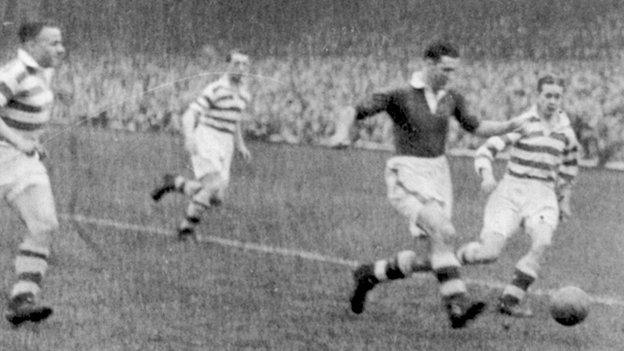
Belfast Celtic trio Jimmy Jones, Joe Douglas and Charlie Tully close in on Linfield's Bob Bryson at Windsor Park in the 1947-48 season
"What is it that makes a Belfast Celtic and Linfield clash so magnetic an attraction not only to the followers of both clubs, but to many other non partisans as well?"
So asked the editorial in the Linfield programme The Windsor Magazine, 70 years ago, before the last ever Boxing Day derby between the west Belfast rivals.
Who could have imagined how the ramifications of the Big Two match on that fateful day (matches were not played on Sundays so the 'Boxing Day' fixtures were on Monday, 27 December, 1948) would resonate for decades to come.
"All we hope for is a grand sporting game and, above all, may the best team win," concluded The Windsor Magazine.
History, however, would show the vanity of this optimism.
Linfield-Celtic games were rarely timid affairs. And this encounter would be remembered for all the wrong reasons.
What would be described in the newspapers as "a savage mob" would leave a man within hours of losing a limb, an off-duty goalkeeper making the most important save of his life, and a board of directors planning a permanent exit strategy from Irish League football.
Following his arrival from Anfield in 1934, Elisha Scott, Belfast Celtic's player-manager, had guided The Hoops to 10 league titles.
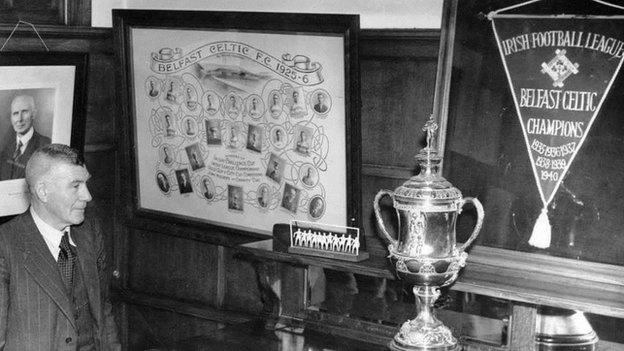
Belfast Celtic manager Elisha Scott looks proudly at the silverware in the club boardroom
A championship trophy at Windsor Park was overdue and having been raised in the shadow of the ground, Scott was more than aware of this. His brother Billy had been the Linfield goalkeeper before moving to Everton.
Things were tight at the top of the league. While the Blues had a three-point lead, Celtic had a jewel in their crown - Jimmy Jones.
The teenage scoring machine, in his second full season, was in potent form with 27 goals from 19 games, including six hat-tricks. It had him well on course to surpass his 62 goals of 1946-47.
A transfer bid of £16,000 from Newcastle United had been rejected as Celtic awaited, and expected, an improved offer.
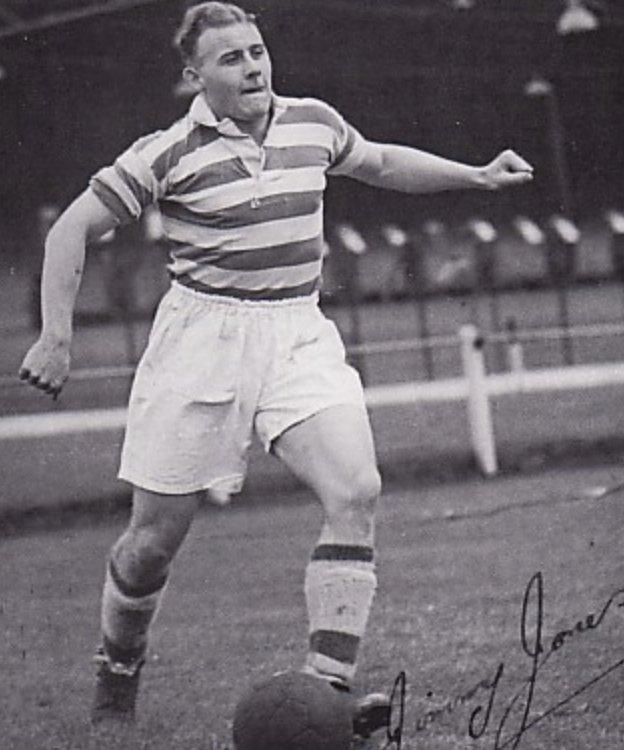
Jimmy Jones had already scored six hat-tricks in the 1948-49 season before the game against Linfield
And besides, Jones loved playing at Windsor Park against the Blues. Six goals in three meetings was proof of that.
"They'd signed me as an amateur but only used me to run the line," Jimmy once told me. "We were all Linfield people, but that changed after they let me go.
"When Scott brought me from Shankill Young Men, the Linfield secretary Joe Mackey was angry. We had words in his office. He would get his revenge."
In the lead-up to the game, tensions were high. Several weeks before, Linfield had lost 2-1 at Celtic Park in a fractious City Cup tie.
"Linfield were always our rivals," remembered Harry Walker, the team captain. "Out of necessity the Blues had a good side because Celtic could not be allowed to rule the roost."
A crowd of 30,000 watched the drama unfold. Linfield were down to nine men by the interval because of injuries to Jackie Russell and Bob Bryson. Joe Mackey's half-time announcement that centre-half Bryson's right leg was fractured (in an innocent challenge with Jones) added to the hostile atmosphere.
When referee Norman Boal dismissed Albert Currie and Paddy Bonnar in the second half, the temperature rose further.
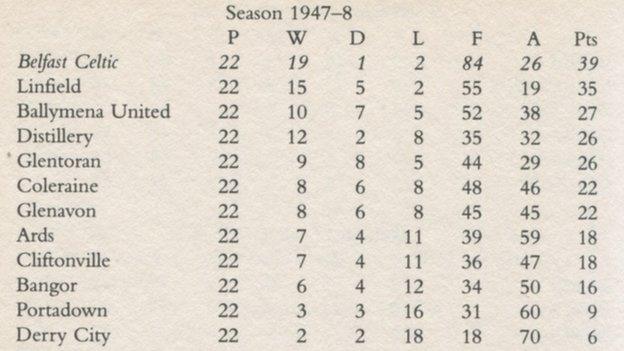
Belfast Celtic were Irish League champions when they visited Windsor Park for the festive fixture
Harry Walker's 80th-minute penalty appeared to have won the game for Celtic before Billy Simpson's equalising header in the dying seconds led to a pitch invasion.
"The reaction to Billy's goal worried me," said George Hazlett, the Celtic winger. "When I saw the uniformed policemen, who were supposed to be neutral, throwing their caps in the air with delight, I realised we were not going to have much protection at full-time."
On the whistle, the crowd invaded again from the Spion Kop. As the players fought their way to safety, Jones was chased on to the terracing under the South Stand, where his right leg was smashed in a flurry of stamps from hobnailed boots.
"No one gave Jimmy protection until I got to him," recounted Jimmy's close friend, Sean McCann, who jumped down 10 feet to shield Jones with his body.
"I was forever grateful for what Sean did that day," said Jones later.
Ironically, Jones' festive present to McCann, the Ballymena goalkeeper, had come on Christmas morning when Jimmy scored what would be his final goal as Celtic hammered United 5-0 at the Showgrounds.
The public outcry about the brutal attack at Windsor Park outstripped any response from the authorities. No arrests were made, while the Irish FA's punishment was to close the ground for two games - reversing the venues for fixtures against Ballymena and Glentoran.
Supporters were more outspoken. Some tore up their membership cards, vowing never to return to Windsor. William McKechnie, writing on behalf of the Amalgamated Blue Supporters Club, denied any involvement and expressed sympathy for all the players.
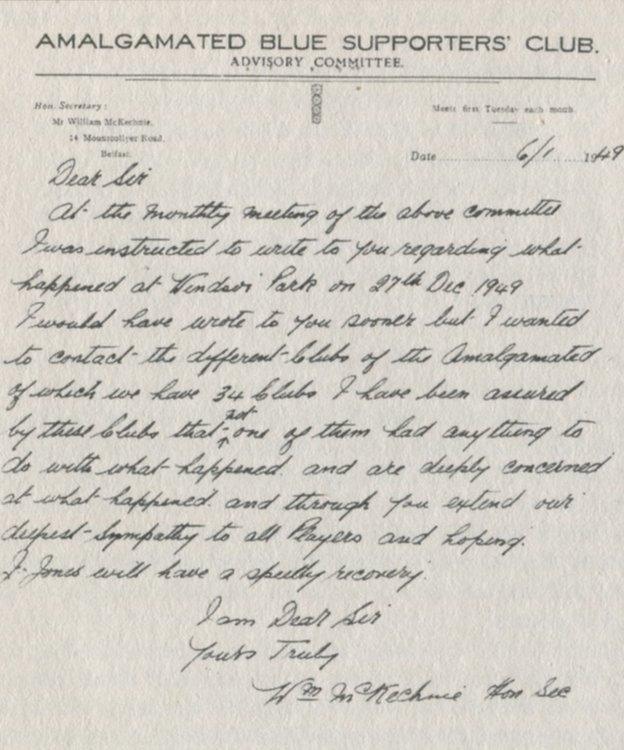
Get well soon! A letter expressing sympathy for the events at Windsor Park on 27 December, 1948
While McCann may have saved Jones' life, Belfast orthopaedic surgeon Jimmy Withers saved his career.
"I wouldn't have played again but for the skill of Mr Withers. One day he came to the hospital to amputate my leg, but decided to wait another few days. I'm glad he did."
And so, too, is the football world. Within two years Jones would recover, albeit, with his right leg shorter than the left.
An attempt to revive his career at Fulham was short-lived because of an objection from another Football League club regarding his registration.
However, at Larne, Glenavon and Portadown, the goals continued to flow as he collected a huge career total of 646, which is still an Irish League record. Jones would also win three international caps for Northern Ireland.
The Belfast Celtic board of directors, appalled at the lack of any meaningful sanction for the events of 27 December, decided to take matters into its own hands.
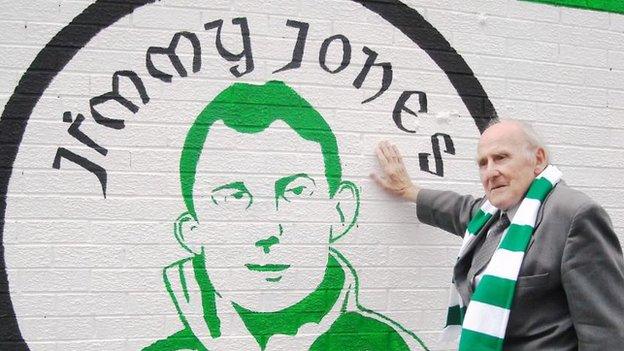
Jimmy Jones stands at a modern mural which immortalises his brilliant career at Belfast Celtic
In the weeks that followed, the main players were gradually sold off to clubs in the Football League. And on Thursday 21 April, 1949, after the 4-3 victory against Cliftonville in what was to be the final match at Celtic Park, a letter of resignation was posted to the Irish League.
Belfast Celtic left immediately on a pre-arranged tour of North America and from there into the history books, taking all the club's memories and achievements with it for ever.
Jimmy Jones died on 13 February, 2014 aged 85.
Crusaders replaced Belfast Celtic in the Irish League.
Belfast Celtic 1881-1949
Honours
Irish League - 14
Irish Cup - 8
Gold Cup - 7
City Cup - 10
County Antrim Shield - 8
Steel & Sons Cup - 5
Regional League - 4
Regional Gold Cup - 3
Intermediate League - 7
Intermediate Cup - 5